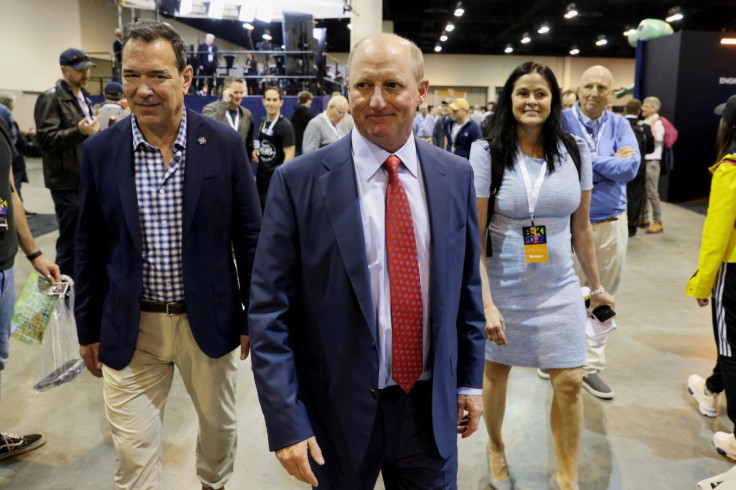Berkshire Shareholders Look Beyond Warren Buffett, Charlie Munger

Berkshire Hathaway Inc shareholders face a question that Warren Buffett sought to tackle at the company's annual meeting: How will Berkshire fare when he's no longer around?
Buffett, perhaps the world's greatest investor, and with the star power to draw fans from around the world, is 91. His longtime vice chairman, Charlie Munger, is 98.
Shareholders who watched them speak for hours at the CHI Health Center arena in Berkshire's hometown of Omaha, Nebraska face the reality they are in the twilight of their careers.
Still, Buffett's loyal investors say they will still stick with Berkshire, citing the honesty, humility, integrity and trust they believe his company and its leadership, current and future, embody.
"The company is more than Mr. Buffett," said Ernesto Medina, a 61-year-old pastor from Omaha. "It really is about people that agree on a certain set of values and ethics. And those don't change. You know--or at least I hope."
Berkshire, whose dozens of businesses include the BNSF railroad, Geico car insurance, and many energy, manufacturing and retailing companies, has a succession plan in place.
Greg Abel, 59, a vice chairman overseeing non-insurance operations, would replace Buffett as chief executive when the need arose, while Vice Chairman Ajit Jain, 70, would likely continue leading insurance operations.
Buffett's oldest son Howard would become non-executive chairman. And Buffett's portfolio managers Todd Combs and Ted Weschler would take over investments.
Asked by a shareholder how Berkshire might change over time, Buffett said its building blocks will survive him.
"You've got a board of directors that understands our culture is 99.9% of running the business," he said. "If we have the same culture, we will be here in 100 years."
Buffett pledged that Berkshire would preserve its "special relationship" with shareholders, and was built to last.
"There is no finish point," he said. "Nobody is waiting to retire or have their option vested or thinking about 'I'll take another job.' People are doing what they want to do."
ARTISTIC LICENSE
Buffett acknowledged there could be changes in how Berkshire operates, noting his own autonomy to make major decisions.
"In a crazy way I look at Berkshire as a painting, and it's unlimited in size," Buffett said. "It's got an ever-expanding canvas, and I get to paint what I want."
Buffett said Abel, in contrast, could face more questions and restrictions from other board members because they know him less well.
"They don't need to, but they'll feel they have to," Buffett said.
Berkshire could also face more pressure to do better on environmental and diversity issues, and corporate governance.
Buffett has fiercely resisted shareholders' calls for improvements, a battle that some analysts see as easier to win in a post-Buffett era.
That's because Buffett still controls 32% of Berkshire's voting power, despite owning just 16% of its shares. He has already given away half his Berkshire stock to philanthropy.
On Saturday, shareholders rejected proposals to improve disclosure of climate-related risks and diversity efforts, and install an independent chair to replace Buffett in that role.
END OF THE PILGRIMAGE?
Clark Nowlin, who founded the Golden Ratio coffee company in Austin, Texas, and got to the arena three hours before doors opened at 7 a.m. CDT. He was glad to see his heroes, Buffett and Munger.
"Every time you say, it's probably the last year, and they set another record in human achievement," he said.
Yet while Abel and Jain joined Buffett and Munger on stage to answer some shareholder questions, and draw wide praise from Berkshire managers and investors, neither has their magnetism.
Shareholders attending this year's meeting were unsure whether to keep making the pilgrimage after the eventual change at the top. Amanda Greenfield, a media strategist from New York who went with her husband, said "obviously the financial community is still going to come," and other shareholders may want to keep their camaraderie alive.
"But people like us may not feel the need to come every year," she said.
This year's shareholder weekend, the first since 2019, was a scaled-back affair, likely because of the pandemic. Buffett said about 12,000 people attended the Friday shareholder shopping day for discounts from Berkshire-owned businesses, down from the 16,188 reported by the Omaha World-Herald for 2019.
The shareholder reception at Borsheims jewelry was confined to the store, shorn of the parking lot tent with live music and a buffet. And even Saturday's annual meeting, normally full, appeared to have a couple of thousand empty seats when it began.
Sue Leuschen, an operations analyst from Omaha, said she was confident in Berkshire's choice of Abel to succeed Buffett, and urged him to keep the weekend going. "We want people to come to Omaha," she said. "He'll still do the 5-K runs, he'll still do all that stuff, because that's what brings people here."
© Copyright Thomson Reuters 2024. All rights reserved.











